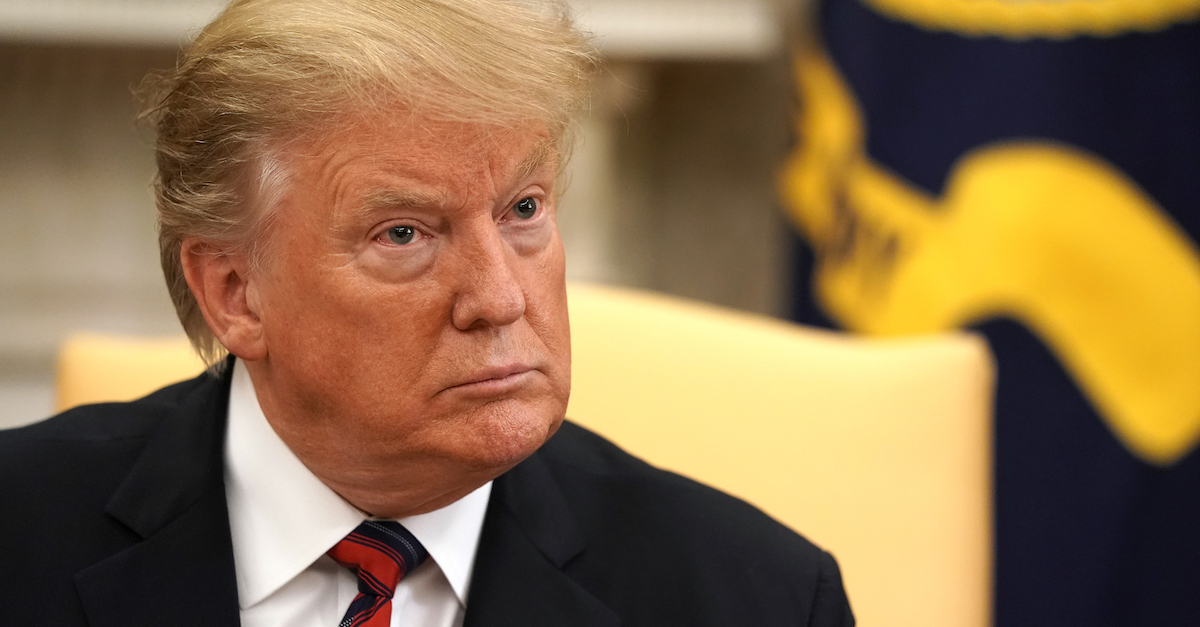
By now, someone has to have told Donald Trump that it doesn’t look good when he endorses products. On Tuesday morning, POTUS tweeted out this valuable Twittermercial for Sen. Tom Cotton’s (R-Ark.) new book, Sacred Duty:
Our great Senator (and Star) from the State of Arkansas, @TomCottonAR, has just completed a wonderful book, “Sacred Duty,” about Arlington National Cemetery and the men and women who serve with such love and devotion. On sale today, make it big!
— Donald J. Trump (@realDonaldTrump) May 14, 2019
Promptly, Twitter flipped out:
He can’t directly promote for a product…ethics investigation needed
— dciaatrue (@dciaatrue) May 14, 2019
You running commercials now?
— Dave Kay (@dckaysd) May 14, 2019
Ah, just the sort of separation between the Executive and Legislative Branches our Founders dreamed of.
— Harry (@DocEgonSpengler) May 14, 2019
So essentially, you are promoting his book in exchange for him promoting you and your ideas. This is an abuse of power and an abuse of office. It should also be another impeachable offense.
— Ed Krassenstein (@EdKrassen) May 14, 2019
Although it certainly feels a little icky to see a sitting president endorse someone’s book, is it actually illegal? Let’s take a look at the statutes that would apply:
5 CFR §2635.702, use of public office for private gain
An employee shall not use his public office for his own private gain, for the endorsement of any product, service or enterprise, or for the private gain of friends, relatives, or persons with whom the employee is affiliated in a nongovernmental capacity, including nonprofit organizations of which the employee is an officer or member, and persons with whom the employee has or seeks employment or business relations.
Trump’s tweet pretty clearly constitutes an “endorsement of any product” for Cotton’s “private gain.” So that seems problematic. This all feels very similar to Kellyanne Conway’s misguided endorsement of Ivanka Trump’s clothing and accessory line. While Conway never faced any serious consequences for improperly promoting the products, she was officially “counseled” not to repeat her mistake.
The rules, however, are different when it comes to the president himself. Due to something of a legal quirk, the president and vice president are exempt from this law; under the statutory definition of “employee,” the rules simply don’t apply to them. In fact, while the rule applies to literally everyone else in government, the statutory definition section explains, “For purposes other than subparts B and C of this part, it does not include the President or Vice President.”
While Trump’s attempt to boost book sales might not be illegal under §2635.702, there’s also, as some have suggested, the possibility that it constitutes a Hatch Act violation.
Isn’t this a violation of the Hatch Act?
— Bobby G (@1nopaperjam) May 14, 2019
The Hatch Act, 5 U.S.C. §§ 7321-26, prohibits executive branch employees from using their official authority to interfere with an election
For more background on how that all works, check out a recent Law&Crime piece here, which again involves Kellyanne Conway — this time for publicly trashing 2020 candidate Joe Biden.
Even if promoting a book were the same as campaigning, and even if Cotton were a current candidate instead of an incumbent, the Hatch Act doesn’t apply to the president. If it did, every president who campaigned on behalf of his successor would have been on the hook for Hatch violations.
Where does that leave us? Are there any legal restrictions relevant to Trump’s endorsement? None that are particularly clear. Unless Trump himself benefitted financially from book sales, it’s unlikely to constitute an illegal emolument. So the endorsement, while potentially improper in a more general sense, may amount to nothing more another typical Trump move, for which the only remedy will be available in November 2020.
[image via Chip Somodevilla/Getty Images]
This is an opinion piece. The views expressed in this article are those of just the author.